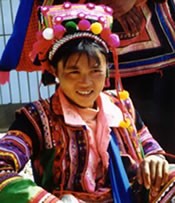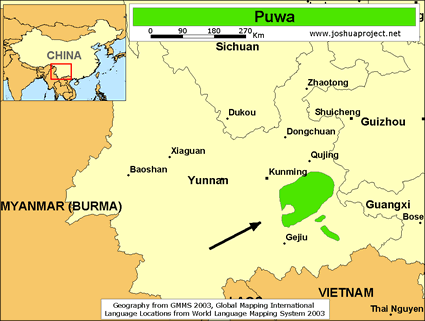The name Puwa is both the autonym and the name used by all other people in the area to describe this group. They are also known as the Phowa. There may be several distinct tribes or clans among the Phowa. The Phowa are not related to the ancient Pu tribe who founded the Ailao Kingdom in Yunnan between the first and fifth centuries AD. Today's Mon-Khmer peoples in Yunnan, such as the De'ang, Wa, and Bulang, are thought to be descended from the former Pu Kingdom. The Phowa are related to the larger Poluo group who inhabit areas in southeast Yunnan.
These people have a reputation for being very independent and hostile to outsiders. They rarely venture into the townships and marketplaces and, therefore, have little contact with members of other nationalities. The Phowa prefer to stay in their mountain villages where they retain their customs, language and lifestyle without interruption.
The Phowa celebrate many festivals throughout the year. One of the largest is the Cattle Festival that takes place during the second month of the lunar calendar. The people pick flowers and place them in the horns of their cows and water buffalo. They also place flowers above the doors of their homes and stables. The primary reason for the festival is the worship of the Mountain god.
The Phowa believe large and powerful demons live inside the highest mountains. They offer sacrifices in honor of these spirits, which - they believe - if not kept happy, can cause disaster to fall on their communities. The Phowa worship numerous spirits. The most revered is the Dragon god. The first "dragon day" of every third lunar month is set aside to appease the dragon. Every village stops work and sacrifices a pig under the village dragon's tree.
There is at least one Phowa Catholic village in Mengzi County. Mengzi has the longest history of Christianity in all of Yunnan. Catholic missionaries first entered the county in 1716 from Sichuan. Beginning in 1894, much work was done in Laozhai and Mingjiu districts, mostly impacting the Hmong but also reaching at least one Phowa village for Christ. Work was also started among the Phowa of Dayakou Village in Mengzi County in 1896. Through the years nine families believed and formed a church. After almost 50 years of persecution, however, none of the converts there still cling to Christ. Their church building still stands but has not been used since 1951.
The Phowa people need to put all their faith and hope in Jesus Christ.
Pray for the Holy Spirit to move mightily among Phowa family leaders, drawing them to open their families to Jesus Christ.
Pray for Phowa disciples to disciple others.
Scripture Prayers for the Phowa, Hlepho in China.
Operation China, Asia Harvest, Copyrighted © Used with permission
| Profile Source: Joshua Project |











